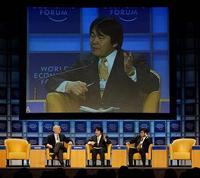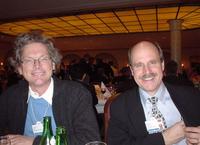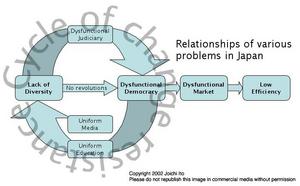Identity and Privacy in a Globalized Community
By Joichi Ito
June 17, 2002
Version 1.0
From atoms to bits
In his Wired Magazine column of January 1, 1995 "Bits and Atoms" Nicholas
Negroponte' describes the shift in focus from atoms to bits.[1]
The shift from atoms to bits is still one of the most significant shifts impacting
society today. As with most technical trends, people have over-anticipated
the short term impact (the dot-com bubble) but have severely under-estimated
the long term impact.
The impact of digital communication networks and globalization on identities
and nations
The industrial revolution triggered a cultural shift causing nations to become
powerful entities in a globalized geo-political world. The world began to
focus on the products of mass production and the world began to focus mostly
on the "atoms". Individuals became able to travel easily and individuals began
to be identified and tracked as physical units and physical borders rigorously
managed. Digital communication technology and cyberspace has increased greatly
the power and value of the non-physical world and is affecting the nature
of national borders and identity. Here I would like to explore some of the
changes facing an era of digital transnational communications, focusing on
value shifting to cyberspace and its impact on identity, authentication and
privacy.
Scalability of communications as profound as mass production
Although cyberspace and bits are rather new, non-physical space is an old
idea. A major step toward large-scale shared virtual communities and
the scalability of communications was the creation of the printing press and
the public. The invention of the printing press created another huge virtual
world, the world of literature and public opinion. Before the printing press,
there was no public. The next and much more significant step was the invention
of electronic communications. Electronic communications such as the telephone
changed speed and in turn the nature of markets, warfare and politics. The
more scalable digital communications and the Internet have allowed the public
to wake up from its semi-conscious state to an actively aware state where
the public can now think for itself and communicate.[2]
The technology of the mass production of physical things allowed a new level
of scalability and division of labor to form. During the industrial revolution,
markets were suddenly flooded with entities rich from the benefits of the
ability to mass produce and money became a much more central component of
our reality and perception of reality. As Marshall McLuhan points out, the
metaphors and language we use molds very much what we can imagine or do.[3] The
abstract management of resources was possible in the modern world of mass
production. Yet, money generally represented atoms, most companies in the
1920's being valued primarily on value of their physical assets.
As information technology has made communication and the transportation and
the management of bits scalable and low cost, more and more of our wealth
represents information -- information about atoms and information about information.
Companies are now generally valued at premium on the value their physical
assets. This "Intellectual Capital[4]"
is the value of the information and other intangible assets held by the company.
More and more of our value, identity and time exists in the digital world.
John Perry Barlow once described cyberspace as "where your money is."[5] Cyberspace
is not just the Internet, but everything digital. The balance of your bank
account is just some entry in some computer. This value is information about
information about some value somewhere, but much of it is self-referential
and mostly very contextual.
Entities beyond physical
There are many instances where entities exist primarily in the digital world.
MUD's
MUD's are multi-user role playing games where players invest thousands of
hours developing characters which own assets, have attributes and relationships
with other players. The time and the knowledge of the players is invested
in the game and the game becomes a rich highly contextual entity in the digital
world which one could argue has substantial control over its representatives
in the physical world.[6]
VISA
VISA for many years was just a contract between its members who wished to
perform transactions electronically. The members created the rules and the
system was completely distributed and each member was responsible for its
own risk. VISA was able to be a brand recognized entity when necessary, but
could disappear from regulators because it was not a legal entity and did
not have a physical location.[7]
Multi-national corporations
Multi-national corporations or "legal persons" often have the benefit of
existing in a limited liability state of global distribution, but often also
suffer from the paralysis of being exposed to multiple jurisdictions because
of the necessity to interact to a great extent with the real world.
Identity
Most people believe that identity is simply one's name, age, sex and address.
In fact, we all have multiple identities that are aspects of the entity which
is unique human being flesh and blood that we are. Actually, companies, government
agencies and political bodies are also entities. Identities can be roles such
as shareholder, officer, rape victim or spouse. Identities are identified
by identifiers. Some identifiers require the authentication of the entity
whereas some identities can be authenticated by uniforms, passwords, secret
hand-shakes or other identifiers which do not expose the entity behind the
identity.
It is essential to consider the issue of identity independently from the
issue of authentication of the entity. When one is engaging in a transaction
with some identity, one is concerned with the risks and attributes of the
identity with respect to the transaction. When one is trying to sell diamonds,
one is concerned with the authentication of the other identity's financial
attributes. If one is trying to receive donated blood, one is concerned, not
with who it came from, but the type and whether it is safe. If one is selling
liquor, one is concerned with the age of the purchaser, not the address.
It is true that for many transactions, it is necessary to authenticate the
entity, but often knowing the name, age, sex and address of the entity one
is interacting with gives us no value. For police dealing with entities within
their jurisdiction, the authentication of the identity gives them to ability
to throw the entity in jail, but for most of us, the reputation of the entity,
cash on hand, validity of the third party insurer or some other attribute
is probably more important. With the global Internet, the ability to punish
an entity beyond the borders of our community do not generally exist. For
this reason, authentication of the entity is much less important than the
authentications of identities and the attributes of these identities.
In fact, in many cases, it is essential that the entities are not identified
and are able to remain anonymous. When one asks questions at a public help
desk, or consults someone about sexual abuse inside of an organization or
tries to reveal information about war crimes in inside of a country ruled
by an oppressive government it is essential that one is able to remain anonymous.
Although pure anonymity is often very important, pseudonymity, the ability
for one not to link identities with each other or with the entity, but for
the identity to be authenticated, is important For the sexually abused student
who is consulting the counselor, both parties need to know that it is the
same identity that they have been corresponding with, but neither need to
know the actual name and address of the other. In fact, many common law countries
allow people to legally use nick names or pseudonyms. Such pseudonyms are
common on the Internet and very useful. The tendency for us to try to force
entity authentication on all pseudonyms is a very simplistic and policeman
like view of identity. Pseudonyms are like roles and by limiting their use
to transactions or participation in communities where reputation or other
form of collateral like attribute can be secured; they can be a very important
and functional tool.[8]
Privacy
Definition
Roger Clarke defines privacy as "Right to privacy is the freedom from unreasonable
constraints on the construction of one's own identity" and calls this digital
identity a Digital Persona.[9]
As law enforcement, national security interests, political interests and
commercial interests continue to collect more and more information about us
and trade and analyze this information a great web of databases of digital
identities are created linking physical entities to a massive dynamic body
of information which represents our digital personas, their attributes and
the relationships between these personas. We currently have very little control
over how these personas are formed and managed and often we do not even know
they exist.
The future of privacy, as Roger Clarke describes, lies in our ability to
manage the construction of one's identity. In order to do this, one must understand
the current state of privacy, the threats to privacy and technologies and
methods that can better protect our privacy.
The EU Directive on Data Protection[10]and
most of the world's privacy policies are based on the OECD's 8[11]
guidelines about privacy that deal more with data protection than data format
and architectures. These guidelines were written over 20 years ago when we
were dealing with large mainframe computers, centralized databases and very
little trans-border dataflow. Today, we are dealing with a distributed network,
much more computing power and much more invasive data collection. The EU Directives
talk about destroying information when it is no longer needed. In today's
world, it is impossible to destroy information once it is created. It lives
on in traces on hard disks, backup tapes, log files, surveillance databases.
Once information has been created, it is important to assume that it will
one day become public. Therefore, what is essential today is to manage the
creation of information about ourselves. The best policy is to create information
only when necessary and disclose only the information necessary for the particular
transaction. It is essential to keep identification information to a minimum
and to keep identifiers as separate as possible in order to make it difficult
for hopefully impossible for the information about a particular transaction
to be used in ways unknown or unintended by us.
Law enforcement and national security concerns are pushing money laundering
laws to make our financial privacy illegal. They are trying to implement a
myriad of biometric database to link information about our identities to our
physical entities to be able to profile and model individuals. All of this
information greatly enhances their ability to find and capture criminals,
terrorists and other people who are not friendly to their concerns. Much of
what these agencies do is essential for order in the world, but most criminals
intentionally avoid identification and regularly thwart efforts by authorities
to track them through such methods. In the mean-time, great databases of the
profiles and relationships of regular citizens end up being compiled and these
databases can and will be abused by governments, politicians, organized crime
and eventually terrorists. The greatest threat to the freedom of individuals
in our great new globalized information economy is the "ends justify the means"
sort of thinking prevalent in counter-terrorist and law enforcement agencies
without thorough consideration of the risk that such massive surveillance
has on the freedom of normal individuals.
In fact, law enforcement and spies have more technology than ever before.
They can read license plates from spy satellites, recognize voices on telephone
lines with computers, plant microscopic tracking devices and genetically identify
strands of hair. Our fears are increased by fraud by trusted executives, terrorist
attacks, computer viruses and a variety of new threats. We need to be aware
that throwing away our privacy and giving unlimited access to government agencies
will not solve these problems.
Privacy enhancement technologies and architecture
In the past, being a privacy advocate meant that one was anti-information
technology. Most information technologies in the past calculated things such
as the efficiency of factory workers or sorted people to send them to concentration
camps. Today there are many technologies that protect or enhance privacy.
For instance, David Chaum's blind signature technology allows users to authenticate
the fact that a piece of digital cash is authentic, but allows the users to
remain anonymous. This allows us to create the digital equivalent to real
cash. This could create problems for agencies trying to clamp down on money
laundering, but it could also help protect the privacy of activists in a totalitarian
regime.
Huge databases of fingerprints or other biometric information can be very
invasive and potentially dangerous, but companies such as Mytec Technologies[12] of
Toronto are working with technologies which allow the biometric information
to be stored on the user's card, rather than in the database. The organization
uses cryptographic technology to authenticate the validity of the information
in the card and provides access with a card and biometric combination, but
does not retain an image of the fingerprint, retina or face that might be
used to provide access.
Zero Knowledge Systems[13] provides
a suite of products that help users manage their identities, the cookies they
receive, the privacy policies of the sites that they visit and a variety of
other things that are usually not visible or selectable to the user.
Eric Hughes once talked about the "open book protocol" which describes an
encrypted accounting system that allowed people to audit a group of linked
accounts while retaining the privacy of the individual entries.
Pharmanet in British Columbia, Canada, through the insistence of Mr. Flaherty,
the Privacy Commissioner, allows patients to assign a password to prescription
records.
I have proposed an idea as a replacement for profiling, database marketing
and recommendation engines. If one were able to store on some small device
or IC card, a local profile of one's shopping habits and one's computer or
phone had a recommendation engine built in, shops and online merchants could
provide us with the profile of the products and we could recommend things
to ourselves. This would allow much higher privacy than the current system
which profiles user on the merchant's servers. My method is also superior
because one's profile could help recommend products even on a first visit
to a site. The difficulty would be in standardizing the product profiling
codes.
The Internet itself has become a method for activists to organize and disseminate
information. A new breed of privacy activist exists who uses technology and
tries to come up with technical methods for protecting privacy and most importantly
tries to influence the architecture of computer and network systems.
Lawrence Lessig - Code
Lawrence Lessig in his book Code[14],
describes how computer code are like laws and the architecture of databases
and networks like politics. It is this war over architecture which occupies
the battles of the digital privacy activists. New data formats will make it
easier and easier to merge databases and link isolated transactions for bits
of information about individuals. It is cryptography that will create the
boundaries and limit the use of information.
Cryptography provides us with the tools to communicate securely with authenticated
peers. Cryptography allows us the flexibility to create a variety of architectures.
Authentication systems range from centrally controlled to completely distributed
systems. Identification systems range from totally anonymous to pseudonymous
to identification of entities. Cryptography gives us the ability to make technically
possible, what we want possible and make technically impossible, that which
we decide should be impossible. Creative use of cryptography allows us to
trust who we would like to trust and be seen and communicate with only those
we wish to communicate with and keep separate and unique. Each community and
the group of identities in that community can have its own rules and architecture
with the proper cryptographic technologies supporting it.
According to Philip Agre, Privacy is no longer a simple discussion of "the
simple tradeoff between privacy and functionality" but a "more complex tradeoff
among potentially numerous combinations of architectures and policy choices."[15]
Online communities[16] and reputation
capital
Online communities such as mailing lists, conferencing systems, online games,
online auctions sites, networks of BLOG's and the Linux community represent
communities that have many of the same attributes as nations.
There are many fundamental differences, but one of the biggest differences
is that because of the lack of physical access and usually the lack of the
ability to access directly the entities behind the identities, these communities
have to govern themselves without the ability to punish the entities behind
the identities physically, such as throwing someone in jail.
The two most important items that a community has to manage its participants
is the securing of reputation which can take the form of personalities developed
through interaction, attribute points in games, reputation points on eBay
or ability to influence and participate in development in the Linux community.
It is this reputation and the ability to take away access to the identity
tied to the reputation which helps enforce the rules and behavior within the
community.
In fact, this is not just an online phenomenon. Organizations such at the
WTO use membership and trade sanction rather than physical attacks as its
primary method of enforcing its rules. These are processes that are in place
with any community, but the online versions are unique in the ability to attach
these processes to online personas as opposed to identities tied to physical
bodies.
In this way, communities that provide value to its members can govern themselves
and manage accountability without access to the physical entities and provides
us with a model for pseudonymous networks.
Culture, communities and the sovereignty of nations
As the events of the last year have shown us, it is very difficult for many
communities to occupy the same space. Each community has its own culture and
rules and each makes sense in its own context[17].
Before, all we needed was the ability to physically isolate the incompatible
communities and create a sense of identity within these borders, and sovereign
nations and physical borders helped to do this. Now with globalized media,
economy and the Internet, people occupying the same space can have access
to multiple cultural contexts.
We have spent the last 20 years trying to get everyone connected together
into the "Global Village". The problem with the global village is that it
is impossible to create a "Global Culture". The solution is to increase tolerance
for different cultures, but also to allow different cultures to co-exist by
creating distinct boundaries between communities, each with its own rules
and culture. It is diversity that makes gene pools, politics and the Internet
robust.
Each community will be able to interact with other communities based on bilateral
or global rules. Each community will be able to enforce its rules through
its ability to sever ties with communities or individual identities.
Human beings will continue to be physically exposed to the rules of the nation
where they live, but digital personas will be able to freely associate with
and join communities globally and will be governed in each community based
on the rules of those communities.
Governments currently try very hard to extend their jurisdiction beyond their
physical borders such as the French concern over Nazi paraphernalia on Yahoo
or the American "War on Terrorism." Most nations try to tax income and track
assets of their citizens beyond their boundaries. Eric Hughes once said, "You
can't tax what you can't point a gun at." The difficulty that these nations
face is that unlike the days when our assets were physical, there is really
very little to prevent digital assets from moving freely and the cost and
difficulty of enforcement becomes extreme.
Global companies will choose tax havens to set up their funds, countries
with loose labor laws for their factories and countries with good food to
host their board meetings. Nations should view themselves more as service
businesses land lords, their taxes being the price and their rules, infrastructure
and culture being the services they provide. Physical nations that provide
physical services can and will charge for these services in the form of tax
or service fees. The easiest way for such a tax to be levied is where the
money enters the physical world, such as in the form of consumption tax. Other
service providers to provide non-physical services, such as online security,
transactions, underwriting and data protection can charge for their services
in the form of transaction fees or service fees. There will be additional
layers of services where the physical nation-states and commercial entities
meet and overlap. Yet, these borders are already quite blurred. Some people
in the UN are calling for the more active use of mercenaries to fight their
wars and many agencies of governments in countries such as Singapore are very
hard to distinguish from commercial entities. In the future nations will mostly
likely be more concerned about trying to be popular and maximizing the value
created by their tax income rather than trying to forcefully beat their own
culture into the hearts and minds of the global community.
Conclusion
In the new world of colliding cultures, a blurring of physical and virtual
identities and a dissolving of the sovereignty of nations, governance and
order becomes the crucial issue. One thing that the Internet has taught us
is that very difficult problems can be solved by unbundling the pieces and
creating protocols for each of the layers or objects to interact and work
together. The Internet has also taught us that no one has to be "in charge".
(When people try, they fail. See ICANN.) The key to success in governing the
communities of the future will be a combination of global rules and practices
for trade and interaction and technical architecture that allows communities
to be independent and separate from each other. Conduct in the physical world
will be governed by physical nations and physical policemen while conduct
in the virtual world will be governed by the rules and methods of each of
the virtual communities. Protocols will have to be created and enforced by
both virtual and physical communities where the bits change to atoms and vice
versa. It is this protocol that will be the core issue and topic of debate
between computer scientists, lawyers, politicians and citizens for the years
to come and the answer will be as much technical as it is legal.
![Joi Ito [logo]](/_site/img/joi-ito-logo-300.png)














